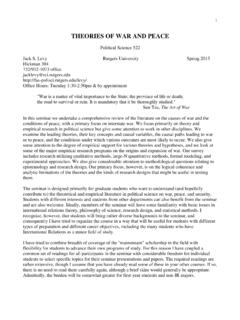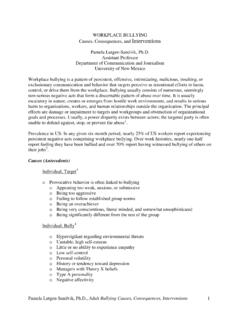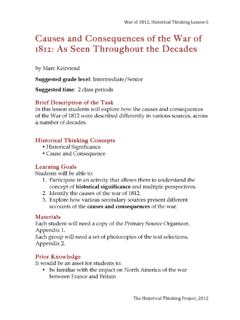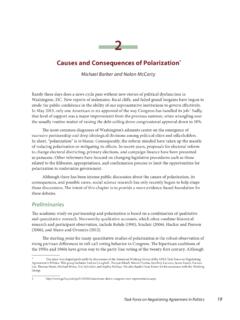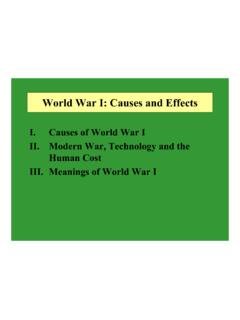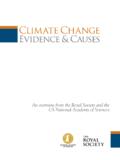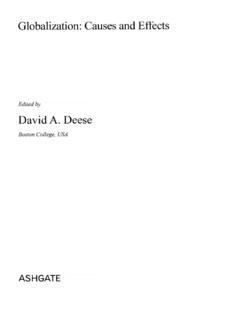Transcription of THE FIRST WORLD WAR: CAUSES, CONSEQUENCES, …
1 THE FIRST WORLD WAR: causes , consequences , AND CONTROVERSIES Professor Jack S. Levy Rutgers University Interdisciplinary Honors Seminar # 01:090:295:04 Fall 2015 Tuesday 2:50pm-5:50pm Honors College, Room S120, CAC Department of Political Science, 304 Hickman Hall, Douglass Campus email: website: Office Hours: to be announced Provisional Syllabus; to be revised The United States entered the Great War, as it was called at the time, to make the WORLD safe for democracy. This was to be the war to end all wars. Instead of ending all wars, however, the FIRST WORLD War turned out to be the primordial catastrophe of the 20th century, the one that paved the way for several subsequent catastrophes.
2 The war marked the emergence of the era of total war, involving the historically unprecedented mobilization of all of the technological, economic, and social resources of nations in support of the war effort. The Great War completed the transformation from wars between kings to wars between peoples. As Winston Churchill had warned in 1901, however, The wars of peoples will be more terrible than those of kings. The Great War was indeed, at the time, the most destructive war in history. It killed over ten million men, wounded countless others, destroyed economies, and led to massive starvation and political and social upheaval throughout Europe.
3 It resulted in the collapse of some of the WORLD s leading empires, the emergence of new nation-states states in their place, the redrawing of the map of Europe, and the beginning of the American Century. The Great War contributed significantly to the Bolshevik revolution in Russia, and it set the stage for the rise of Hitler, the Second WORLD War, the Holocaust, and, indirectly, for the Cold War. The Great War fundamentally transformed the social and cultural spheres as well. It shattered the growing optimism associated with what we now call the FIRST era of globalization, characterized by unprecedented levels of economic, social, and cultural interactions between states and societies in an increasingly interconnected WORLD .
4 The war triggered profound changes in the workplace, the family, and gender relations throughout the West. The experiences of the war also generated new literature, poetry, art, and film that defined our images of what the Great War was like, and indeed shaped our more general images of war. 2 Few were spared the war s destruction and other negative consequences , and few emerged better off after the war than they were before. This naturally leads to the question of how did it happen? A hundred years later, we have no conclusive answer but a great deal of debate. 2014 marked not only the centennial of the Great War but also the end of the FIRST hundred years debate regarding the war s origins ( causes ).
5 As one historian commented, more has been written about the FIRST WORLD War than about any secular event in the history of the WORLD . Undoubtedly one reason for the absence of scholarly consensus on the origins of the war is its complexity. As the historian Christopher Clark argues, the FIRST WORLD War is the most complex event of modern times. Another reason for the absence of consensus is that the scholarly debate about what caused the war has been politicized, entangled in the last hundred years of international politics and conceptions of national identity. The year 2014 witnessed countless commemorations of the centennial of the Great War throughout Europe, along with a tidal wave of new books, articles, and journalism about the causes , consequences , and legacy of the war.
6 Within two years there will be some form of remembrance in the United States, marking the centennial of the American experience of the Great War. For these reasons and more, this is a good time for an intense examination of the Great War, a fundamentally transformative event that in many respects marked the birth of the modern age. FOCUS OF THE COURSE This seminar will cover many diverse aspects of the Great War. It will provide a broad understanding of the causes of the war, the conduct of war on the battlefield, the social and economic mobilization for war at home, the political and economic and social consequences of the war, its broader cultural impact, and the ongoing legacy of the war.
7 We will complement this breadth of focus with a more detailed examination of particular topics. Given the diverse backgrounds, interests, and disciplinary orientations of students in the seminar, I will allow students to select these topics for investigation, as those topics will define their research papers for and oral presentations to the seminar. Students can choose to examine the role of a particular state in the outbreak or expansion of the war; a particular analytic cause of war, such as private economic interests or militarism; the management of war economies; the social mobilization for war on the home front; pacifist movements; wartime atrocities and other violations of the law of war; medical innovations or nursing associated with the war; the nature of military strategy; the impact of war on the workplace or on gender relations; the nature of poetry, art, music, or filmmaking during the war; American intervention in the war; the treaties ending the war; or other topics.
8 I will say more about possible research topics, and offer suggestions, later in the syllabus and in class. Students having a difficult time coming up with a topic will be encouraged to look at something relating to the causes of the war. This is a manageable topic that has worked out well in my other classes. 3 By spending a fair amount of time on a particular research paper, each student will complement his/her breadth of understanding of the many faces of the war with more detailed knowledge about a particular topic. Collectively, that will generate about fifteen topics that we study in depth. More importantly, however, students will develop research, writing, and speaking skills.
9 Learning how to define a research topic, gather and organize research materials, write a research paper, present one s argument and evidence to a group, and field questions about a paper is one of the most important things one can learn in college. This Interdisciplinary Honors Seminar is a good place to start, or perhaps to continue, developing those skills. PEDAGOGICAL OBJECTIVES The seminar has several primary aims. One is to gain a general understanding of the FIRST WORLD War and its causes , consequences , social and cultural impact, and continuing legacy. A second is to use the FIRST WORLD War as a vehicle to better understand war in general.
10 The Great War was unique in many respects, but it is still useful as an exemplar to understand broader phenomena, including the causes of war, globalization, the interconnections between war and society, and historical memory, among other themes. In fact, general theories of war in the field of International Relations in Political Science have been disproportionately influenced by the experience of the Great War. A third aim, especially for students analyzing the causes or termination of the war but probably for many others as well, is to learn to make causal arguments, and to appreciate the kinds of historical evidence appropriate for confirming or disconfirming different theoretical or interpretative arguments.

